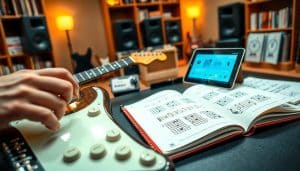John Deacon, the iconic bassist of Queen, only played live with them three times after Freddie Mercury died. His last show was at the Bejart Ballet in Paris on January 17, 19971. Even though he stepped back from fame, Deacon’s music impact is huge. His amazing bass skills and songwriting are seen in hits like “I Want to Break Free” and “Another One Bites the Dust”. These songs still touch fans everywhere2.
Deacon’s complex bass lines played a big part in making Queen’s sound legendary. His music legacy lives on. He chose a private life, but Brian May and Roger Taylor, his bandmates, deeply respect that. His influence in music remains strong and inspiring3.
Key Takeaways
- John Deacon, Queen’s bassist, delivered only three live performances post-Freddie Mercury’s passing1.
- He was instrumental to Queen’s distinct sound with memorable songs like “I Want to Break Free” and “Another One Bites the Dust”2.
- Deacon’s bass lines remain critical to the band’s iconic tracks3.
- His decision to retire from the public eye is deeply respected by his former bandmates1.
- John Deacon’s impact as a music legend continues to inspire generations of musicians
Introduction to John Deacon: The Underrated Force of Queen
John Deacon, born in Leicester, England, played a key role in Queen. He started with a love for soul music and an Electrical Engineering degree. Joining Queen in 1971, he helped shape their innovative sound.
Background Information
Deacon’s mix of technical skill and creativity boosted Queen’s fame. He invented the Deacy Amp, enhancing the band’s unique sound. Even though he wasn’t as flashy as his bandmates, his work was essential. Queen’s debut album in 1973 featured his standout bass in “Liar”4. The album, including “Keep Yourself Alive,” blended rock styles from bands like Led Zeppelin and Jethro Tull4.
Quiet Influence on Queen
John Deacon may have been quieter than Freddie Mercury, but his impact was huge. He wrote hits like “Another One Bites The Dust” and “Under Pressure.”5 These songs showed his knack for memorable bass lines and solidified his role in the band. MusicRadar even named him the 30th best bassist of all time5.
Despite his quiet nature, Deacon made a big splash in music. His bass lines in “Under Pressure” and “Another One Bites The Dust” are legendary5. His innovative approach and skill have inspired many, cementing his status as an underrated legend.
Early Life and Musical Beginnings
John Deacon was born in 1951, in Leicester, England. His love for music and electronics started early6. He excelled academically, getting high grades that led him to Chelsea College, London. There, he earned a first-class honours degree in Electronics6.
Childhood and Education
Deacon’s passion for music was clear in his Leicester childhood. His interests in electronics and music combined to shape his future. By age fourteen, he founded his band, The Opposition7. His education also reflected his love for electronics and music, hinting at his future impact on Queen’s songs6.
First Band: The Opposition
At fourteen, Deacon started his music journey with The Opposition6. It was his introduction to performing and working with a band. When he switched to bass guitar, the band became The New Opposition6. Even as a student at Chelsea College, Deacon stayed committed to music. This commitment led him to Queen, marking a significant step in his music career6.
Joining Queen: A Serendipitous Beginning
John Deacon’s journey with Queen is a story of fate. He met Brian May and Roger Taylor, leading to an audition in a lecture room. This marked the moment they became complete, as Deacon was the last to join.
The Audition
The audition was a key moment. Deacon showed off his deep musical and technical skills right away. His work on the Deacy Amp highlighted his huge impact on their sound, making him a core part of the band. Brian May, a collector of band memorabilia, valued Deacon’s input89.
Early Impressions and Integration
Deacon fit into Queen smoothly. First known as “Deacon John,” he soon used his real name on albums. This change was vital as it helped define Queen’s music. Deacon’s skills were essential in the studio, adding depth to their sound9. His knack for enhancing their music solidified Queen’s legacy in rock history.
John Deacon’s Signature Songs and Bass Lines
John Deacon’s work with Queen shines because of his amazing songwriting and iconic bass lines. As a remarkable bassist, he’s made a lasting impact on their music.
Another One Bites the Dust
“Another One Bites the Dust” shows Deacon’s unique blend of soul and dance. It’s Queen’s biggest hit and brought their music to more fans1011. His bass line in this song is legendary.
You’re My Best Friend
“You’re My Best Friend” is all about his love for his wife and his talent for catchy tunes11. It’s a global hit, highlighting Deacon’s role in Queen with his memorable bass and moving lyrics10.
Deacon’s work has given us iconic Queen songs and shown his massive role in the band. His songs, with iconic bass lines, are loved worldwide.
Role in Queen’s Iconic Albums and Songs
John Deacon played a key role in Queen’s music, more than just playing bass. His work made the band’s music memorable. His songs and collaborations helped shape Queen’s legacy.
Breakthrough Hits
Deacon wrote “Misfire” for Queen’s third album, “Sheer Heart Attack”. This was a big step in their career12. He also penned “You’re My Best Friend”. This hit sold over a million copies in the US12.
“Another One Bites the Dust” is one of Queen’s biggest hits, with 7 million copies sold. It also has over a billion streams on Spotify12. Deacon’s “I Want To Break Free” reached the top of the charts in 198412. His contributions were vital to Queen’s success.
Under Pressure Collaboration
“Under Pressure” with David Bowie is a rock milestone. Deacon’s bassline in this song is legendary12. This work proved his extensive impact in music. It highlights his influence in Queen’s unforgettable tracks.
Queen’s Live Aid show in 1985 showed off Deacon’s skills. It’s seen as one of rock’s greatest moments13. Queen has sold between 250 and 300 million records worldwide. This incredible achievement cannot be discussed without mentioning Deacon’s role13.
For more on music legends, visit this link.
John Deacon’s Songwriting Contributions
John Deacon played a huge role in Queen’s songwriting. He wrote some of the band’s best-loved songs. These hits have captured hearts all over the globe.
Top Hits Written by Deacon
“I Want to Break Free” is a standout track by Deacon, peaking at Number 3 in the UK charts11. His skill in creating catchy tunes and meaningful words shines here. “You’re My Best Friend” also showcases his talent. Released in 1976, it’s adored by fans11.
Deacon’s “Another One Bites The Dust” was a massive hit in the US, hitting Number 111. His songs are known for their strong melodies and broad appeal.
Collaborative Efforts
Deacon was great at working with others too. He and Freddie Mercury co-wrote “Friends Will Be Friends”11. This 1986 hit from A Kind Of Magic shows Deacon’s versatile talent.
“One Vision” is another great collaboration by Deacon and Queen. It highlights the perfect teamwork of the band. Freddie Mercury influenced Deacon greatly, improving his pop songwriting skills14.
John Deacon’s work, both alone and with Queen, has made a huge impact. His music not only enriched the band’s legacy but also left a mark on rock and roll.
Musical Style and Technique
John Deacon’s musical influences and style have deeply touched those who love music. His bass technique inspired many. He was influenced by Motown and soul music. Deacon started as a guitar player in 1965, then moved to bass in 196615. This change led to an incredible career in bass playing.
Influences and Evolution
Deacon’s early love for Motown’s soulful beats shaped his music path. He is known for fingerstyle playing, occasional slapping, and playing rhythm guitar on some Queen songs16.
Artists like Lee Sklar and Nathan East admire him. Deacon’s skill grew with Queen, leading to big hits. His work is crucial to songs like “You’re My Best Friend” and “Another One Bites The Dust”15.
Impact on Other Musicians
Deacon’s talent is widely recognized. His basslines in “Under Pressure” and “Another One Bites The Dust” are famous. They ranked high in the Top 40 Coolest Basslines Ever poll15. This shows how his technique stands out and influences musicians worldwide16.
Deacon played many types of bass guitars, like Fender Precision and Rickenbacker 400115. His music keeps inspiring others, showing the amazing things bass playing can do.
Here’s a look at some of Deacon’s key musical pieces and techniques:
| Song | Bass Techniques |
|---|---|
| Another One Bites The Dust | Fingerstyle, trills, occasional slapping |
| Bicycle Race | Fingerstyle, grainy slides |
| Under Pressure | Popping, plucking, fingerstyle |
John Deacon’s blend of musical influences shows he’s a bass pioneer. His techniques continue to guide and inspire new artists.
John Deacon’s Retreat from the Spotlight
John Deacon stepped back from fame after Freddie Mercury died. This event deeply affected him. It changed his life drastically.
The Impact of Freddie Mercury’s Death
 He then did less music. He felt Queen wasn’t the same without Freddie. Fans and bandmates felt this too.
He then did less music. He felt Queen wasn’t the same without Freddie. Fans and bandmates felt this too.
Decision to Retire
After a few shows, like the Freddie Mercury Tribute Concert, Deacon retired in 1997. He chose his family and privacy over fame. Fans and bandmates honor his decision to step back.
- Deacon Escolastico Daniel Corniell Tejada was assigned to Ascension, Manhattan17.
- Deacon Douglas FitzMorris was assigned to St. Patrick, Yorktown Heights17.
- Deacon Robert Leavy Jr. was assigned to Holy Name of Jesus, Otisville17.
People still honor John Deacon’s work and his lasting mark in Queen. His stepping away hasn’t lessened his impact. His music deeply touches many.
| Deacon | Assigned Parish |
|---|---|
| Escolastico Daniel Corniell Tejada | Ascension, Manhattan17 |
| Douglas FitzMorris | St. Patrick, Yorktown Heights17 |
| Robert Leavy Jr. | Holy Name of Jesus, Otisville17 |
Life After Queen: Personal Endeavors
John Deacon chose privacy after leaving Queen, focusing on personal interests. He’s still admired in music, especially for leaving fame behind. He now spends his time as a family man in Putney, providing for his six children18. Though he has a fortune of £105 million18, Deacon enjoys a quiet retiree life away from the spotlight. This choice has earned him even more respect from fans and peers.
Deacon stays out of the public eye, but he keeps his stake in Queen Productions Limited, which made £18.5 million in 201718. He skipped public appearances, like the Queen biopic Bohemian Rhapsody event, preferring privacy over fame19. His life post-Queen is a peaceful mix of solitude and contemplation, a sharp shift from his band days.
Deacon’s last musical effort was in 1997 with Queen’s “No-One But You (Only The Good Die Young)”20. Choosing a quieter life, he focuses on family and personal growth. His choice echoes a musician’s journey beyond fame, cherishing personal life over previous successes.
Legacy and Recognition
John Deacon’s work in music has made him highly respected. He became Queen’s permanent bassist in February 197121. This was after six years of working in music. His quiet nature didn’t hide his vital role in the band’s success.
Induction into the Rock and Roll Hall of Fame
Deacon got into the Rock and Roll Hall of Fame21. He didn’t go to the event, but it was a big honor. It showed the lasting effect of his music. Through his bass work and songwriting, he has influenced many fans.
Lasting Influence on Music
Deacon’s impact goes beyond just Queen. He’s also in the Songwriters Hall of Fame. This shows his ongoing influence on music. His own songs and his work with others continue to motivate new music styles.
John Deacon is still praised in the ever-changing music world. His special way of playing the bass is still admired22. Even though he left the scene, his achievements and hall of fame induction keep his memory alive.
Interviews and Testimonials from Fellow Musicians
Many reputable musicians recognize John Deacon’s big impact on Queen and music in general. Bass experts like Billy Sheehan and Mark King have praised him. They admire Deacon’s skill and how he blends practicality with creativity.
Brian May has shared thoughts on Deacon leaving Queen after Freddie Mercury passed away. He talked about a conversation in 1996 when Deacon said he couldn’t keep going with the band23. Danny Miranda, who toured with Queen, called Deacon a “loose and fluid” bassist. He was good at finding unique places in songs for creativity24. Deacon’s work on “Under Pressure” made it third in the top 40 basslines24. He still helps Queen with big decisions23.
Insights from Industry Legends
Brian May often talks about how much Deacon contributed to the music world. Deacon joined Queen in February 1971 and quickly became key to the band24. His “Another One Bites the Dust” bassline was a hit, coming seventh in a major poll24. These facts show Deacon’s huge influence on Queen’s sound and more.
Anecdotes and Praise
Stories from musicians show Deacon’s important but quiet role in Queen. His work on “Killer Queen” has been praised as a little masterpiece24. Billy Sheehan likes how Deacon’s bass fits well with the rest of the band. He compares him to John Paul Jones from Led Zeppelin, who also helped other musicians stand out24. Such stories and compliments prove the lasting respect for John Deacon in music. His legacy continues to earn appreciation worldwide.
To learn more about John Deacon’s impact on Queen’s music, check out this detailed article23.
The Deacon Amp: A Revolutionary Invention
John Deacon’s passion went beyond his bass skills to his love for electronics. This led him to create the Deacon Amp. His deep electronics knowledge made a unique amp. It made Queen’s music sound better, especially with Brian May’s guitar.
Conception and Design
Deacon’s love for electronics sparked the creation of the Deacon Amp. He used his skills to design a special amp. It gave a clear, warm sound. This was key for Queen’s varied music style.
The amp’s tech led to better sound reproduction. It let the band try new sounds and tones.
Impact on Queen’s Sound
Brian May loved using the Deacon Amp. It helped create Queen’s iconic guitar sounds. The amp’s effects were huge.
It let the band try new sounds. Deacon’s work on the amp changed how the band sounded. The Deacon Amp showed how Deacon influenced Queen’s music.






